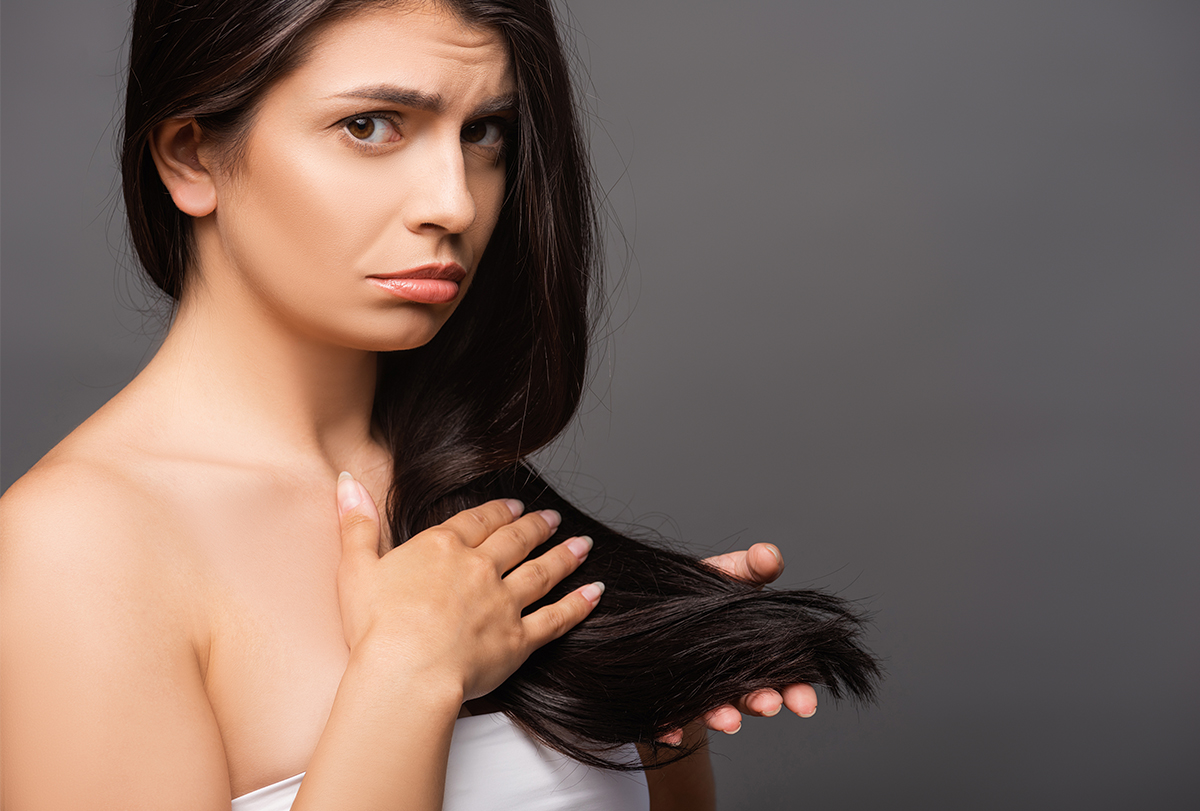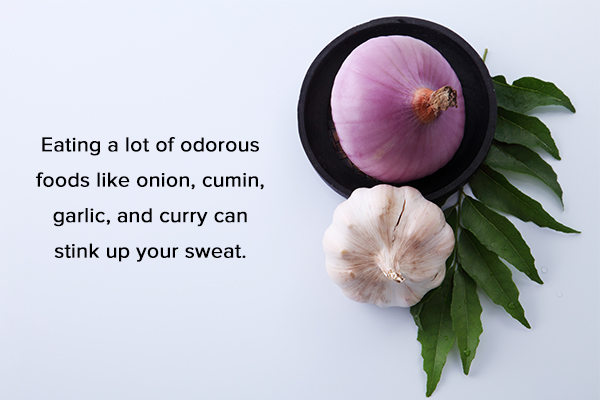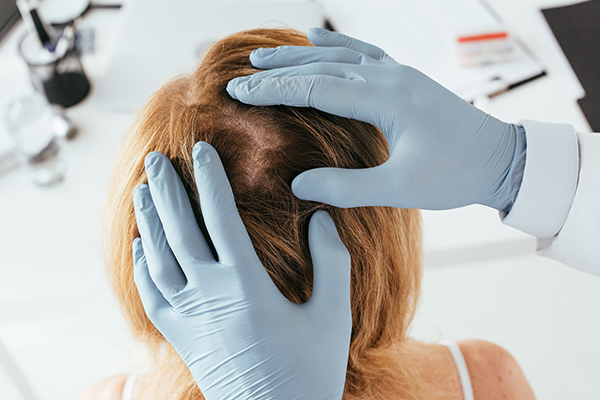In this article:
Smelly hair or smelly scalp syndrome is exactly what it sounds like: a foul odor stemming from the hair and scalp due to an underlying microbial overgrowth. The scalp is naturally inhabited by bacteria, which feed on sweat, sebum, dead cells, and other dirt that build up on the scalp over time.

Smelly hair can cause a lot of embarrassment and distress as it reflects poorly on personal hygiene. Negligent hair hygiene is the major reason for the buildup of sweat, oil, and grime on the scalp, but other factors can also aggravate this process.
Causes of Smelly Hair
Smelly hair and smelly scalp syndrome can be a result of the following:
1. Not washing your hair regularly
Your hair and scalp accumulate dirt, dead cells, sweat, and sebum daily, especially if you go out often and have a naturally oily scalp. Thus, skipping hair wash for many days leads to a gradual buildup of these substances on your scalp, which then becomes a breeding ground for malodourous bacteria and fungi.
2. Washing your hair too often
Excessive hair washing with harsh shampoos or hot water can strip away the natural lipids from your scalp and can make it increasingly dry. The sebaceous glands are then triggered to produce extra oil to rehydrate the scalp, but this can worsen your smelly hair/scalp problem.
People with an oily scalp or very thin hair require a head wash with a mild shampoo every alternate day, while others can afford to wait for a day or two more.
3. Hormonal imbalances
Puberty is characterized by hormonal changes in the body that send the sebaceous glands into overdrive. This is why teenagers often suffer from excessively greasy skin, which paves the way for acne as well as sebaceous buildup on the scalp. (1)
Similarly, anxiety and stress can also adversely impact hormone levels to induce excessive sebum production on the scalp.
4. Improper diet

Foods such as onion, cumin, garlic, and curry contain oils that give them their strong smell. Eating a lot of such odorous foods can stink up your sweat. This is because the pungent oils are excreted from the body through the skin pores, including the ones on your scalp.
5. Seasonal conditions
A humid environment during summer and monsoons can make you sweat a lot, increasing the risk of bacterial or fungal infections on the scalp. (2)
6. Pollution
Environmental and chemical pollutants can get stuck in your oily hair and scalp to make them smell even worse.
7. Wrong hair products
Regular use of chemical-laden hair products can dry out your scalp and disturb its natural pH. This will result in an overproduction of sebum to make up for the loss of moisture, (2) thus contributing to smelly hair and scalp.
8. Covering your hair with sweat-trapping headgear
Wearing a scarf, cap, or hat for prolonged periods can cut off airflow to your scalp and induce excessive sweating. This is why you are advised to choose headgear made from light, breathable materials to keep your scalp properly ventilated.
9. Other medical conditions
Smelly hair and scalp can also be a by-product of underlying skin conditions such as allergic contact dermatitis, psoriasis, seborrheic dermatitis, and psoriasis, as well as metabolic or hormonal disorders such as an overactive endocrine gland.
Symptoms of Smelly Hair
The main symptom of smelly hair or scalp syndrome is the stink coming from your head, which is often compared to the unpleasant smell of sour milk, dirty socks, vomit, or soiled diapers.
Depending on how bad your condition is, your hair may start smelling soon after taking a shower or a few days later. The stench can put you off as well as others in your proximity.
Treatment for Smelly Hair

Treatment for smelly scalp syndrome depends on its root cause, but it’s usually hard to detect. In most cases, the smell is the result of an underlying scalp infection, which can be bacterial or fungal.
Bacterial scalp infections are treated with medicated hair products containing antibacterial agents such as triclosan, (3) whereas yeast or fungal scalp infections are treated with antifungal hair products that contain ketoconazole. (4)
Depending on the nature of your problem, the doctor may recommend degreasing shampoos or salicylic acid-based shampoos to get rid of excess sebum, residue-removing shampoos if your hair collects a lot of dirt, and sulfur or selenium sulfide shampoos to tackle dandruff.
If the cause is unknown, the doctor may recommend a combination of different interventions and hair care tips to address various contributing factors that make your hair and scalp smell bad.
Diagnosing Smelly Hair
The doctor may conduct a variety of tests to diagnose the root cause of your smelly hair and scalp, which include:
- Skin scrapings – Scrapings of the scalp are examined under the microscope using a standard KOH preparation or sent to a laboratory for further analysis. (5)
- Hair pull test – The doctor gently pulls the hair of the patient to look for signs of secretions or skin crusts near it.
- Patch testing – To rule out possible allergies.
- Dermoscopy – This involves examining the hair and scalp with a special device called the dermatoscope. This technique can help identify specific symptoms of diseases such as psoriasis, seborrheic dermatitis, folliculitis, tinea capitis, and scarring alopecia that otherwise remain undetected through normal testing. (6)
The doctor will specifically look for signs of any skin abnormalities, defective hair follicles, and other worrying symptoms such as redness, pus-filled pimples, blisters, fissures, scaling, and hair loss to rule out possible complications.
When to See a Doctor

Smelly scalp or hair syndrome calls for medical attention in the following cases:
- If the problem persists or becomes worse despite preliminary hair care at home
- If the foul smell is disturbing your sleep
- If the smell is accompanied by uncontrollable itching in your scalp and hair that keeps you up at night
- If you notice abnormal hair fall along with the bad smell
Final Word
Dust, dirt, sweat, sebum, dead cells, and environmental pollutants settle on your hair and scalp every day, more so after a strenuous physical activity and outdoor visits. This is why it is important to wash your hair and scalp regularly to rinse out these off-smelling substances.
Conversely, if you don’t wash your scalp and hair for several days, they will start to stink due to the gradual buildup of these impurities.
In normal cases, the foul smell will go away once you rinse your hair and scalp thoroughly with shampoo. However, if the smell persists despite regular hair washing, then it may be stemming from an underlying bacterial or fungal infection that will require proper medical treatment.
If left untreated, the infection can trigger other discomforting symptoms and complications besides making the smell even stronger. The smell is usually pungent enough to be noticed by others. So, it’s best to address the problem as soon as you notice it to save yourself the embarrassment and discomfort.

- Was this article helpful?
- YES, THANKS!NOT REALLY


